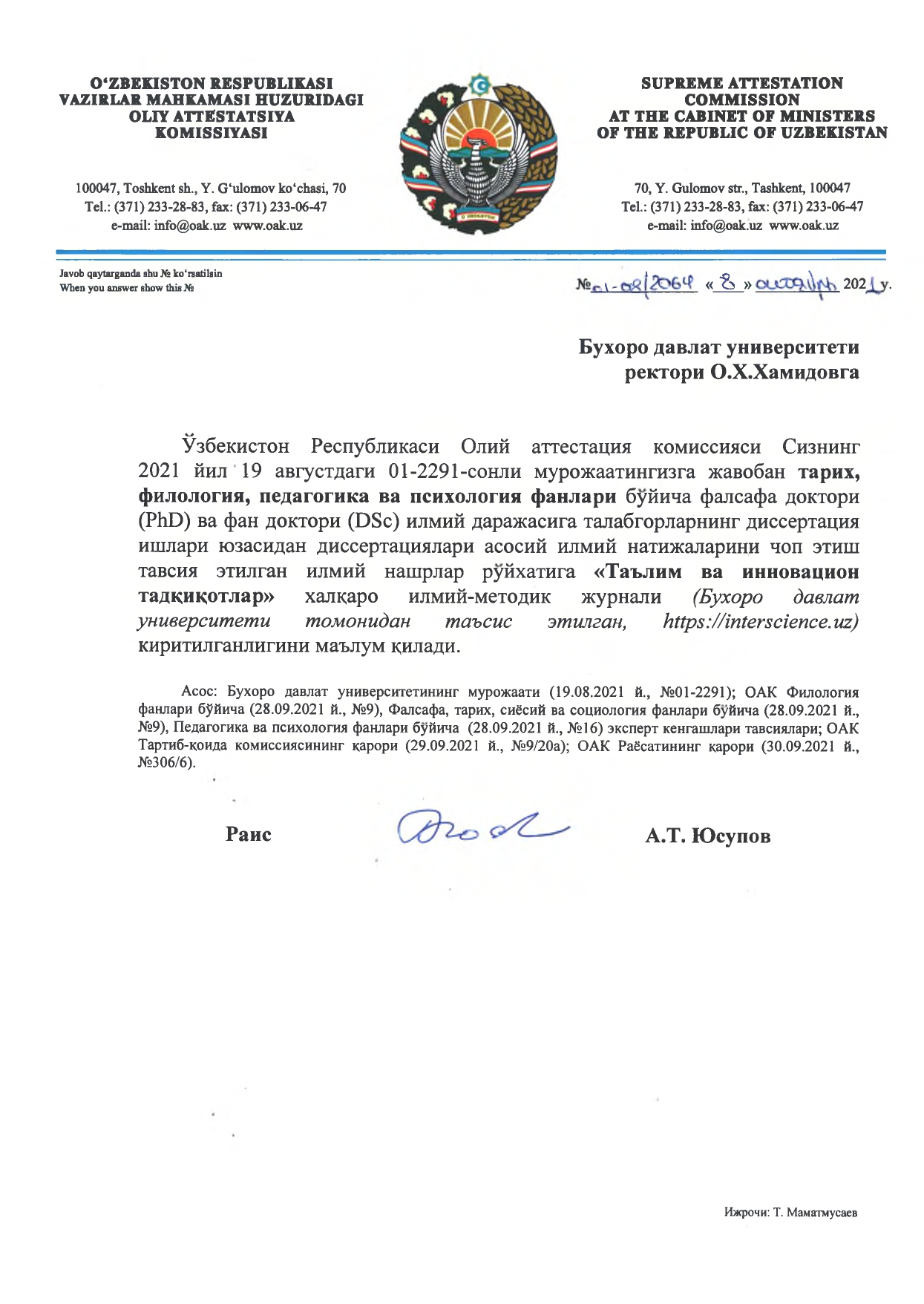IJTIMOIY VA HISSIY KOMPETENTLIKNING NAMOYON BO‘LISHI
Ataxo‘jayeva Shaxlo Anvarovna University of Business and Science NOTM Pedagogika va psixologiya kafedrasi dotsenti, Psixologiya fanlari bo‘yicha falsafa doktori, PhD.
Ключевые слова:
ijtimoiy kompetentsiya, hissiy kompetentsiya, ijtimoiy mahorat, ijtimoiy qobiliyat.Аннотация
Ijtimoiy kompetentsiyani o‘rganish insonning ijtimoiy xulq-atvorini o‘rganishning eng muhim yo‘nalishlaridan biridir. Maqolada ijtimoiy kompetentsiya bo‘yicha o‘tgan tadqiqotlarning yutuqlari pedagogik va psixologik nuqtai nazardan muhokama qilinadi va tahlil qilinadi. Ijtimoiy kompetentsiya tushunchasi va mazmuni aniqlanadi, keyin esa hissiy kompetentsiyaning tarkibiy qismlari va ularning funktsiyalari ijtimoiy kompetentsiya faoliyatining muhim omillari sifatida muhokama qilinadi. Ijtimoiy ko‘nikma va qobiliyatlarni tahlil qilish va o‘lchash amaliyotining tavsifi. Ijtimoiy ko‘nikmalar va bilimlarni rivojlantirish uchun qo‘llaniladigan usullarni muhokama qilish maqolani yakunlaydi.
Библиографические ссылки
Anderson, P. L. (2000). Using literature to teach social skills to adolescent with LD.
Intervention in School and Clinic, 35, 271–279.
Argyle, M. (1999). Development of social coping skills. In. L. Frydenderg, (Ed.), Learning to cope (pp. 81-106). New York: Oxford University Press.
Bandura, A. (1986). Social learning theory. London: Prentice Hall.
Birch, S. H., & Ladd, G. W. (1997). The teacher-child relationship and children’s early school adjustment. Journal of School Psychology, 35, 61-79. doi: 10.1016/j.jsp.2005.06.001 Carlton, M. P. & Winsler, A. (1999). School readiness: The need for a paradigm shift. School Psychology Review, 28(3), 338-352.
Chen, K. (2006). Social skills intervention for students with emotional/behavioral disorders: A literature review from the American perspective. Educational Research and Reviews, 1(3), 143-149.
Cole, P. M. & Tan, P. Z. (2007). Emotion socialization from a cultural perspective. In. J. E.
Grusec, & P. D. Hastings (Eds.), Handbook of socialization (pp. 516-542). New York: The Guilford Press.
Crick, N. R. & Dodge, K. A. (1994). A review and reformation of social informationprocessing mechanisms in children’s social adjustment. Psychological Bulletin, 115(1), 74-101.
Birch, S. H. & Ladd, G. W. (1997). The teacher-child relationship and children’s early school adjustment. Journal of School Psychology, 35(1), 61-79. http://dx.doi.org/10.1016/S0022- 4405(96)00029-5
Damon, W. (1983): Social and personality development. London: SAGE Publication. Inc.
Denham, S. A., Blair, K. A., DeMulder, E., Levitas, J., Sawyer, K., Auerbach-Major, S. & Queenan, P. (2003).
Preschool emotional competence: Pathway to social competence? Child Development, 74(1), 238-256. doi: 10.1111/1467- 8624.00533
Denham, S. A., Salich, M., Olthof, T., Kochanoff, A. & Caverly, S. (2004). Emotional and social development in childhood. In P. K. Smith, & C. H. Hart, (Eds.), Childhood Social Development (pp. 307-328). Oxford: Blackwell Publishing Ltd.
Denham, S. A., Bassett, H. H. & Wyatt, T. (2007). The socialization of emotional competence. In J. E. Grusec, & P. D. Hastings (Eds.), Handbook of socialization (pp. 614- 637). New York: The Guilford Press.
DiPrete, T. A. & Jennings, J. L. (2011). Social and behavioral skills and the gender gap in early educational achievement. Social Science Research,.
Dowling, M. (2001). Young children’s personal, social and emotional development. London: SAGE Publication.
Inc.





